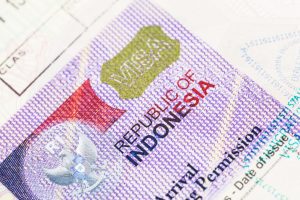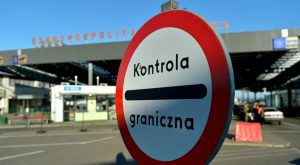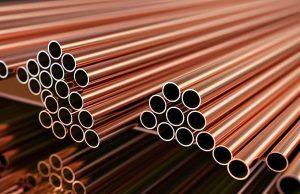
The Cabinet of Ministers of Ukraine has approved a draft agreement with the government of the Republic of Indonesia on the mutual cancellation of visa requirements.
The corresponding decision was made at a government meeting on Wednesday.
The draft agreement provides for the possibility of visa-free travel by citizens of the countries of the parties for up to 30 days during each visit of Ukrainian citizens to Indonesia and for up to 30 days within 60 days for travel of Indonesian citizens to Ukraine.

Ukraine has fulfilled all the obligations assumed during the meetings of the Mixed Commissions on International Road Freight Transport, but the Polish side does not honor the agreement at the presidential level, the Ministry of Infrastructure of Ukraine has said.
As reported on the website of the Ministry of Infrastructure, a working meeting of the Ministers of Infrastructure of Ukraine and the Republic of Poland Vladyslav Krykliy and Andrzej Adamczyk was held in Kyiv on Monday, during which the Ukrainian minister pointed out the fact that Ukraine’s fulfillment of its obligations led to a significant increase in the share of use of permits for 2019 by Polish haulers.
Krykliy reiterated that Poland should lift transit restrictions for Ukrainian haulers, since this negatively affects not only trade relations between the two countries, but also with other EU countries.
At the same time, he said that Ukrainian haulers are ready to compete in the two-sided market.
The ministers of Ukraine and Poland also discussed the work of crossing points across the Ukrainian-Polish border, in particular, the Korcheva-Krakovets point.
In addition, Krykliy said that currently the Verkhovna Rada is expected to consider at second reading a bill that solves the problem of VAT payment by work performers and service providers under the so-called “Polish loan,” but asked the Polish side to speed up the work of the construction company to repair the crossing point.
The Ukrainian minister suggested that the Polish side conduct a joint audit to determine the possible reasons for the appearance of queues at the border crossing points with the involvement of a third independent party, and introduce general border and customs control at crossing points to increase their efficiency.

Ukrainian enterprises reduced the import of copper and copper products in value terms by 9% to $93.276 million in January-October this year compared to the same period last year.
According to customs statistics published by the State Customs Service of Ukraine, export of copper and copper products decreased 7.6% to $63.017 million in the first 10 months of 2020.
In October, copper and copper products were imported in the tune of $11.915 million, and exported in the tune of $7.934 million.

Ukraine plans to increase the annual flow of foreign tourists to 30 million people, domestic to 60 million by 2030, and also intends to increase the industry’s share in GDP to 10%, according to the National Economic Strategy 2030, presented by Prime Minister Denys Shmyhal on Friday.
According to the document entitled “Vectors of Economic Development” published within the framework of the National Economic Strategy 2030, Ukraine ranks 78th in the Travel & Tourism Competitiveness Index, while the goal is to rise to the 45th place by 2030.
Last year, the number of accommodation facilities in Ukraine increased by 13% – up to 5,300, while the number of beds was 370,000. At the same time, the average number of beds concerning the area of the country in Ukraine is 1.6/sq. m, while in Europe this figure is 9.2/sq.m, the document says with reference to a number of statistical departments.
According to the document, the export of tourist services in Ukraine at the end of 2019 amounted to $1.62 billion, of which 90% is personal tourism.
In addition, among the competitive advantages of Ukraine is the size of the average check for hotels, which, taking into account their operating profitability at the level of 40%, opens up potential for hotels in the three-four star segment.
The document creators also call the market of recreational and health-improving services and human resources the strengths of Ukrainian tourism.
Challenges include safety and security, environmental resilience, protection of natural resources, and outdated transport infrastructure. The priority is, among other things, improving the comfort system, managing quality and introducing a classification system by hotel categories.
Delta Wilmar invests $5.5 mln in new sunflower oil bottling shop

The cost of agricultural production in Ukraine in January-September 2020 decreased by 4.1% compared to the same period in 2019.
According to the State Statistics Service, the cost of crop production in January-September decreased by 6.2%, livestock products by 1.3%, material and technical resources of industrial origin used in agriculture by 10.3%.
At the same time, according to the service, the cost of agricultural production in September increased by 3.9% compared to the previous month. Thus, the cost of crop production grew by 2.9%, livestock products by 6.3%, but at the same time, the cost of material and technical resources grew by 2.3%.
As reported, the cost of agricultural production in Ukraine in 2019 decreased by 0.64% compared to 2018.

The volume of Ukrainian exports of goods in October amounted to $4.69 billion, which is 1.31% higher than the same month in 2019 and 10.41% higher compared to September this year.
Deputy Minister of Development of Economy, Trade and Agriculture, Trade Representative of Ukraine Taras Kachka said on Facebook, so far in the first 10 months of the year (year-on-year), exports showed a decline of 4.82%, imports – 12.21%.
“More good news: we have reduced the deficit by $3.97 billion, that is, more than a half,” he wrote.